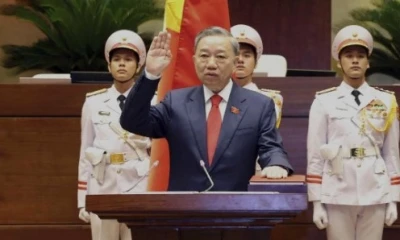Vietnam’s parliament elected Public Security Minister To Lam as the country’s new president following the resignation of his predecessor amid a sweeping anti-corruption campaign on Wednesday. This move comes after the Communist Party’s vigorous “blazing furnace” crackdown on graft, led by General Secretary Nguyen Phu Trong, which has implicated thousands, including senior officials and business leaders.
Lam, who also serves as the deputy head of the anti-corruption steering committee, has been seen by analysts as using his position to target political adversaries. In his inaugural address as President, Lam expressed his commitment to combating corruption and other negative phenomena.
Lam succeeds Vo Van Thuong, who stepped down in March after only a year in office due to what the party cited as “violations and shortcomings.” Vietnam’s leadership structure, guided by the Communist Party, includes the President, Prime Minister, head of the National Assembly, and the party general secretary.
The role of National Assembly chairman had also been vacant since April, following the resignation of the previous chairman over similar issues, leaving two of the top four leadership positions unoccupied for a month.
To Lam, 66, has been the Public Security Minister since 2016, known for his stringent stance on human rights movements in the country. There were speculations that Lam might retain his position at the Public Security Ministry while assuming the presidency, an unprecedented move in Vietnam. However, parliament decided to relieve him of his ministerial role just hours before the vote.
Nguyen Khac Giang, a visiting fellow at the ISEAS – Yusof Ishak Institute, noted, “The indecision on the MPS post shows that other elite members are hesitant to grant the MPS to any of To Lam’s proteges. And To Lam himself is reluctant to relinquish control over the main executioner of the anti-corruption campaign.”
The National Assembly elected Lam with 472 out of 473 votes in a secret ballot. On Monday, Tran Thanh Man, 61, was nominated as the new head of the National Assembly, and the party appointed four new politburo members.
Political upheaval is rare in Vietnam, where leadership changes are typically managed with an emphasis on stability. However, the past 18 months have seen notable resignations, including those of the Deputy PM and the head of the party’s economic commission. Former President Vo Van Thuong’s predecessor, Nguyen Xuan Phuc, also resigned during this period.
Lam’s career has been entrenched within the secretive Public Security Ministry (PSM), which oversees dissent and the surveillance of activists. Rights groups report an intensified crackdown on civil society groups in recent years, with around 200 activists currently imprisoned, according to The 88 Project, a Vietnam-focused human rights organisation.
Lam previously faced public outrage when he was filmed eating a gold-leaf-covered steak at London’s Nusr-Et Steakhouse, owned by Turkish chef Nusret Gokce, also known as Salt Bae. This incident occurred shortly after Lam had paid respects at Karl Marx’s grave and highlighted the stark economic disparities in Vietnam, where the average person earns a few dollars a day. Following this, a noodle vendor who posted a parody video of the incident was jailed, sparking further controversy.
With his new role as the President, To Lam’s actions and policies will be closely watched, both domestically and internationally, as he navigates the complexities of Vietnam’s political landscape amid ongoing anti-corruption efforts.

















